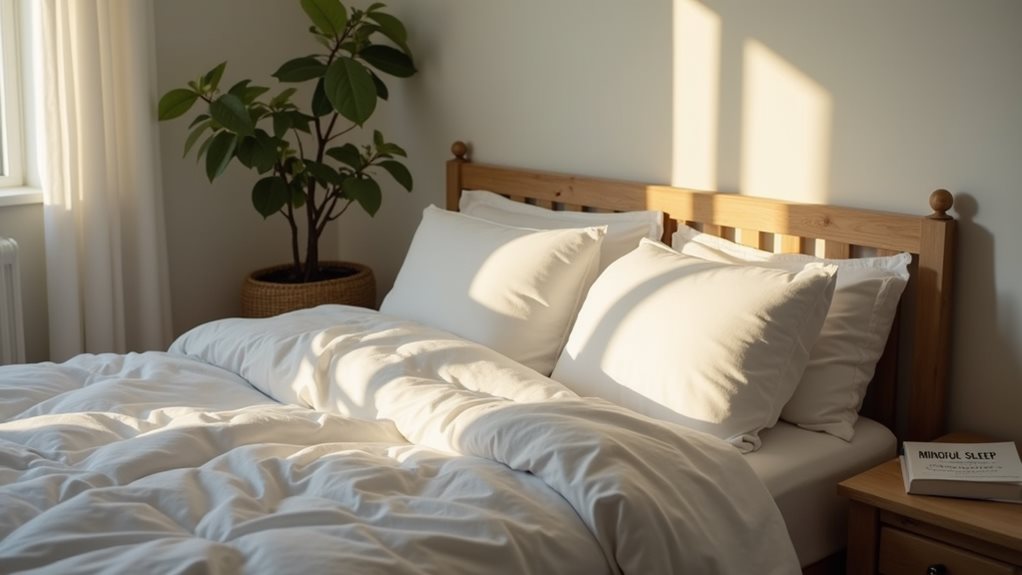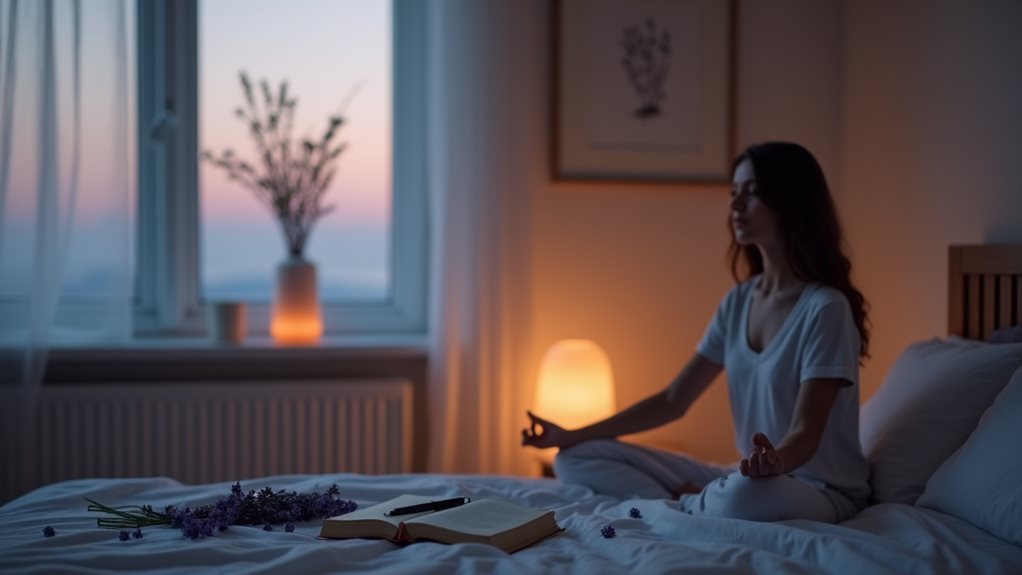
Mindset shifts that counter negative thoughts and promote mindfulness greatly enhance sleep quality and duration. By identifying and reframing detrimental thought patterns, individuals can mitigate the mental clutter that impedes sleep. Establishing a calming pre-sleep routine and optimizing the sleep environment further support restful nights. Additionally, incorporating mindfulness techniques like meditation and controlled breathing helps to soothe the mind before sleep, setting the stage for deeper and more rejuvenating rest, with further insights available on managing these practices effectively.
Key Takeaways
- Recognize and challenge negative thought patterns to reduce bedtime anxiety and promote relaxation.
- Adopt a consistent bedtime routine to signal your body it's time to sleep.
- Embrace mindfulness practices such as meditation or deep breathing to quiet the mind before bed.
- Ensure a sleep-conducive environment by keeping the bedroom dark, cool, and quiet.
- Use cognitive restructuring to replace irrational nighttime worries with more balanced perspectives.
Understanding the Impact of Negative Thoughts on Sleep
While many factors contribute to sleep disturbances, the role of negative thoughts is particularly significant. Negative thought cycles and cognitive distortions, such as catastrophizing or overgeneralizing unfavorable situations, profoundly impact sleep quality.
These mental patterns provoke heightened anxiety and stress, which in turn disrupt the natural sleep process. The persistent whirl of negative thoughts keeps the mind active when it should be resting, leading to difficulties in both falling asleep and maintaining sleep.
Consequently, understanding and addressing these disruptive thought patterns is vital for improving sleep health and overall well-being, highlighting the intricate link between the mind's workings and sleep.
Strategies for Challenging and Reframing Negative Thoughts
To effectively challenge and reframe negative thoughts, one must first recognize their patterns and triggers.
Cognitive restructuring, a psychological technique, involves identifying irrational beliefs and systematically replacing them with more balanced thoughts. Engaging in thought journaling can facilitate this process by providing a clear record of negative thoughts and their context, making patterns more apparent.
This evidence-based approach allows individuals to dissect their mental processes, understand the root of their distress, and develop healthier, more rational responses.
Over time, this practice contributes to improved mental clarity at bedtime, reducing sleep disturbances linked to anxiety and repetitive negative thinking.
Establishing Positive Sleep Habits for Improved Rest

Establishing positive sleep habits is essential for anyone seeking to enhance their overall sleep quality. A conducive sleep environment and a consistent bedtime routine are pivotal.
Here are practical strategies:
- Maintain a consistent sleep schedule: Go to bed and wake up at the same time daily.
- Optimize your sleep environment: Guarantee a comfortable mattress and minimal noise.
- Limit exposure to blue light: Avoid screens at least an hour before bedtime.
- Engage in a relaxing pre-sleep routine: Consider reading or gentle stretching.
- Keep the bedroom cool and dark: Use blackout curtains and adjust the thermostat.
The Role of Mindfulness in Enhancing Sleep Quality
Incorporating mindfulness into one's nightly routine can considerably enhance the quality of sleep by fostering a state of calm and presence that eases the shift into rest.
Mindfulness benefits include reducing mental clutter and moderating the stress responses that often hinder sleep. Techniques such as sleep meditation effectively quiet the mind and prepare the body for sleep, by focusing on breath and bodily sensations.
This practice not only diminishes the time taken to fall asleep but also improves sleep depth and overall night rest. Regular engagement in mindfulness can transform one's sleep quality, promoting a healthier, more rejuvenated waking state.
Practical Mindfulness Techniques for Nightly Relaxation

While considering the positive impacts of mindfulness on sleep, it becomes essential to explore specific techniques that promote nightly relaxation.
Implementing practical mindfulness methods can greatly improve the ease of moving into sleep. Here are five effective techniques:
- Breathing Exercises: Practice deep, slow breathing to reduce stress and induce calmness.
- Guided Imagery: Visualize peaceful scenes to distract from daily stressors and engage the mind positively.
- Progressive Muscle Relaxation: Tense and relax each muscle group sequentially to release physical tension.
- Mindful Reflection: Spend a few minutes in gratitude or gentle review of the day.
- Body Scan Meditation: Focus attention sequentially on different parts of the body to enhance bodily awareness and relaxation.
Frequently Asked Questions
Can Certain Foods or Diets Improve Sleep Quality?
Certain foods and diets can enhance sleep quality. Herbal teas and sleep-inducing foods like cherries and almonds contain compounds that promote relaxation and melatonin production, supporting better sleep when consumed as part of a balanced diet.
How Does Physical Exercise Impact Sleep Patterns?
Physical exercise, when woven into daily routines, generally extends sleep duration and enhances quality. Regular exercise routines foster deeper sleep cycles, proving both insightful and practical for those struggling with inconsistent sleep patterns.
What Role Do Genetics Play in Sleep Quality and Disorders?
Genetic predisposition considerably influences sleep quality and susceptibility to sleep disorders. Research shows that genes affect the regulation of sleep cycles and vulnerability to conditions like insomnia, emphasizing the importance of genetic factors in sleep health.
Are There Any Effective Sleep Supplements or Medications?
Effective sleep supplements include melatonin and valerian root, known for supporting sleep hygiene. Evidence suggests these natural remedies aid in improving sleep quality. However, consulting healthcare providers before beginning any supplementation is recommended for safety.
How Does Room Temperature Affect Sleep Quality?
"An ounce of prevention is worth a pound of cure." Optimizing room temperature enhances the sleep environment, as temperature regulation is essential for uninterrupted sleep, promoting a deeper, more restorative night's rest.
Conclusion
As the night sky blankets the world in its serene darkness, embracing a mindset shift can be the key to unfastening the door to tranquil slumber. By challenging the stormy clouds of negative thoughts and settling into a routine of positive sleep habits and mindfulness, individuals can transform their nocturnal journey. This mental renaissance fosters a peaceful domain where restorative sleep is no longer a dream but a nightly reality, enhancing overall well-being and vigor.


